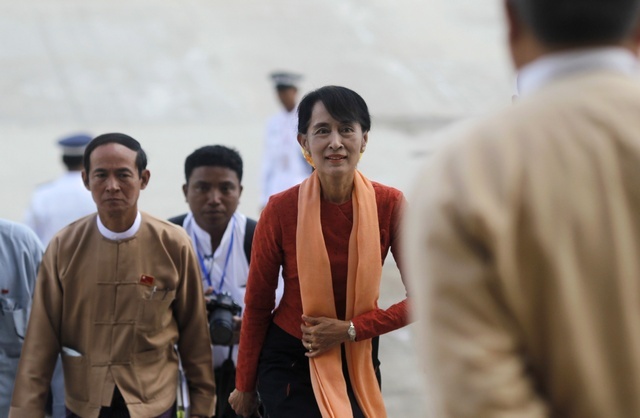Burma’s lower house of parliament began debating on Monday the eight voting systems proposed by the Electoral Review Commission.
Among the proposed systems, the commission said that proposals 3 and 4 should be considered by the lower house because they are “the most appropriate for Burma”.
However, during Monday’s debate, National League for Democracy (NLD) representatives rejected those proposals, both of which combine elements of proportional representation (PR) and “first-past-the-post” (FPTP) voting systems.
Ye Tun, an MP from the Shan Nationalities Democratic Party, said that during the debate NLD representatives expressed their desire to continue using the current FPTP system.
“The NLD said the current FPTP system is simple and ensures transparency for the public,” he said. “Moreover, the public never wanted to change voting systems in the first place, so Burma should continue using the current system.”
The military-backed Union Solidarity and Development Party (USDP) is known to support changing to a PR system, while the NLD and several ethnic groups are vehemently opposed to altering Burma’s voting system—even though PR systems are designed, in part, to give minorities more representation in government.
The Electoral Review Commission’s first suggestion is to continue using the FPTP system, which is essentially a winner-takes-all electoral system whereby the candidate with the largest percentage of votes in a given district wins.
The NLD supports the FPTP system and has previously stated that it “would not accept” any type of PR voting system because Burma has no history of using PR, a voting system which NLD central executive committee member Win Myint described as “not currently relevant” to Burma’s political arena.
In reality, the NLD wants to stick with the “winner-takes-all” FPTP system because the party has a good chance of winning the largest number of votes in many constituencies in the 2015 election.
Yesterday Aung San Suu Kyi said that if the voting system is changed a referendum should be held to gauge public opinion on the matter because the public never asked to change the system in the first place.
But all indications are that the NLD will continue supporting the FPTP system. For instance, during yesterday’s lower house debate NLD Representative Khin San Hlaing said, “We don’t see why the current [FPTP] system should be changed unless it causes a major problem.”
The Electoral Review Commission’s second proposal is a standard PR system, which an MP from the National Democratic Force (NDF) proposed in a bill that eventually passed an upper house vote with the support of USDP representatives.
Both the NDF and USDP stand to benefit if Burma changes to a standard PR system because they will be allocated seats in parliament based on the percentage of votes their parties receive in each constituency.
Standard PR systems have districts that are geographically large, so each district has many representatives. Citizens then vote for political parties rather than individual candidates, and the parties make a list of their top candidates for each district. If, for example, a party wins 20 percent of the votes in a 100-seat district, then that party’s top 20 candidates win a seat in that district.
[related]
PR systems are thought to benefit minority parties because even if a minority party wins only 3 percent, then it would still qualify for three seats in a 100-seat district.
If Burma changes to a PR system, the USDP would have a chance of winning a relatively large number of parliamentary seats because—unlike the FPTP’s winner-takes-all method—even if the NLD wins a majority (e.g. 70 percent in a 100-seat district) of votes in a particular district and the remaining 30 percent of people vote for the USDP, then 30 seats would be allocated to the USDP’s top 30 picks.
If the USDP then enters into a coalition with minority parties (or combines its 30 seats with its constitutionally-guaranteed right to control 25 percent of parliament), then the USDP might end up with enough seats to control parliament by itself.
Alternatively, if the USDP does not wind up with a majority of parliamentary seats it could enter into a coalition with minority parties in order to obtain a majority (or plurality) of seats—in which case the USDP would most likely lead the coalition. In either scenario, the USDP would benefit from the PR system at the expense of the NLD.
Voting system proposals 3 and 4 are hybrids which combine features of the PR and FPTP systems. They are quite similar—except with regard to the way votes cast for other candidates from the winning candidate’s party are treated.
Under proposal number 3, these votes are transferred to the winning party and then PR principles are used to distribute seats to the various parties’ top picks based on the percentage of votes each party receives.
However, under proposal number 4 votes cast for other candidates from the winning candidate’s party are transferred to the losing parties, and then PR principles are used in a similar fashion to determine how many seats each party obtains.
Proposals 5, 6, 7 and 8 simply recommend that a certain percentage of districts use a standard FPTP system and the rest use a standard PR system.
During Monday’s lower house debate, the NLD reiterated its conviction that there is no reason to change the voting system that Burma has been using for many years. However, the USDP and NDF are likely to keep pushing for an electoral system that incorporates elements of a PR system.
The Electoral Review Commission was established by Lower House Speaker Shwe Mann after various groups—especially the NLD and ethnic groups—objected to the upper house’s approval in June of a bill recommending that Burma change to a PR system.
It is expected that if a new system is chosen, it will only be used for union parliamentary elections— not regional parliamentary elections.



